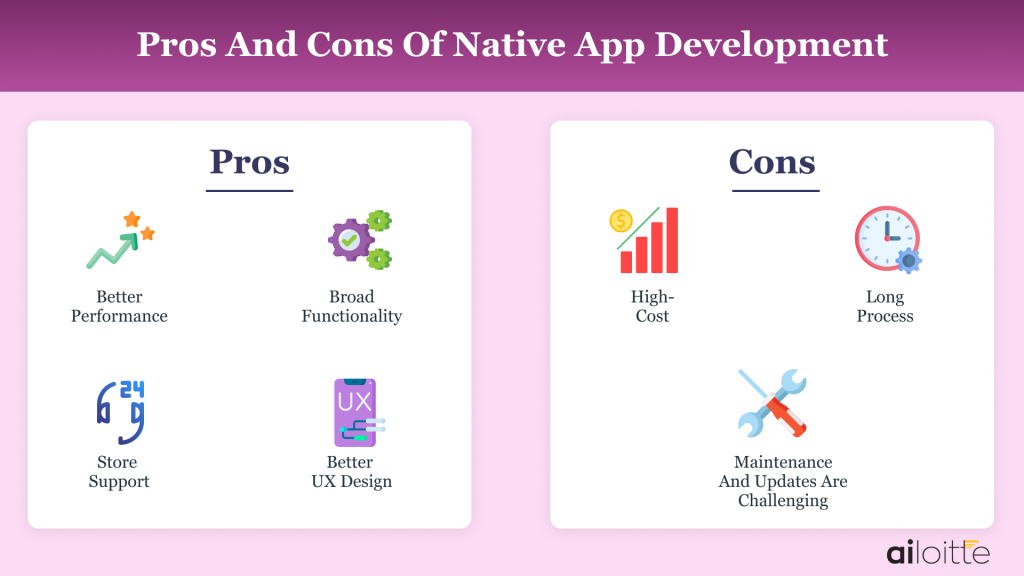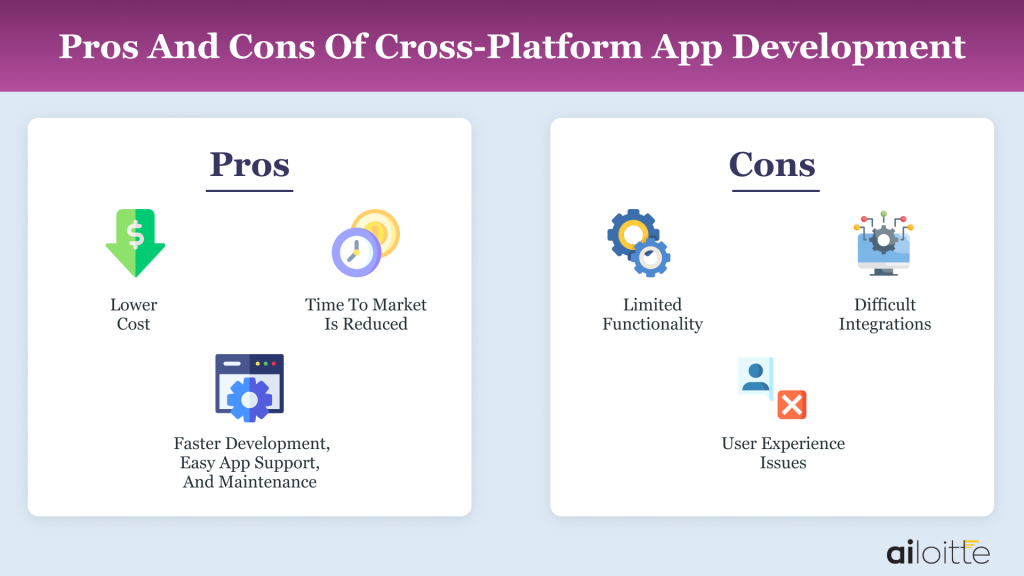Business owners worldwide have seen a positive impact of mobile apps in expanding to new markets exponentially and targeting new customers easily.
As per Allied Market Research, the global mobile application market is projected to reach $407.31 billion by 2026, growing at a CAGR of 18.4% from 2019 to 2026. A key aspect of being a part of this statistics lies in choosing between the two platforms – Android and iOS.
Statistica reports show that Android powers about 74.13% of smartphones, while the iOS market share is estimated at 24.79% worldwide. However, over time, a new mode of development has come up – Cross-platform, which brings us to the main question. What to choose and which is best – Native vs Cross-platform?
Having a clear understanding of a business’s end goal helps you to choose the right option for the project, i.e. native app vs cross-platform.
Before we dive into the differences between the two, let us first understand what is native mobile app development.
What is Native App Development?
Native mobile app development is the process of developing a mobile app for a single platform by native app developers. Development is done on Native platforms such as Android and iOS by using a particular software development kit (SDK) and an integrated development environment (IDE). Typically, these apps use native mobile app development tools such as Java or Kotlin, while for iOS, Swift, and Objective-C.
Android Native app development and native ios app development can be used for building complicated, large-scale projects as they are well known for delivering exceptional user experience(UX), high performance, and speed by utilizing the hardware features such as a microphone, camera, GPS, etc.
Some native application examples include PokemonGo, Google Maps, Pinterest, WhatsApp, Twitter, etc.
What is Cross-Platform App Development?
Cross-platform app development is the process of creating an app that is compatible with multiple mobile devices/ operating systems using a universal language. The primary benefit of cross-platform app development is code reusability, which simplifies the entire development process.
The development is done using cross-platform development tools like Flutter, Xamarin, Adobe PhoneGap, Appcelerator, or React Native.
Some of the best cross-platform app examples include Instagram, Facebook, Walmart, Bloomerang, etc.
Let’s look at the differences between native apps vs cross-platform applications.
Native v/s cross-platform applications: What are the differences
| Criteria | Native | Cross-platform |
| Architecture | Different apps for different platforms | One app for multiple platforms |
| Target audience | Limited to specific platforms | Reach a large number of users |
| Code reusability | None | 60% can be reused |
| Hardware accessibility | Complete hardware support | Limited |
| Testing | Can be tested with tools in the framework or browser | Vary from frameworks available |
| Speed and app performance | Rapid, responsive, and crash-free applications | Slower than native applications |
| Team size | Big team size(different team for a different platform) | Small to mid-sized team |
| Authorization for the app store and google play | Simple and Easy | The process of approving apps in respective stores can be lengthy |
| Rendering Engine | Native | Native |
| Tools used | XCode, AppCode, Android Studio | React Native, Flutter, Xamarin |
| Cost | Higher | Cost-effective |
| Development time | Time-consuming as code is written for each platform | Time-saving as code is reusable |
Now that we have seen the mobile app development platforms comparison, let’s move on to the pros and cons of native mobile app capabilities and cross-platform mobile app capabilities.
Pros and Cons of Native App Development

Pros of native app development.
1. Better Performance
Native apps provide exceptional performance in terms of speed, responsiveness, and operational efficiency as they are written in platform-specific programming languages. They fully utilize the device processing capability, resulting in a shorter load time.
2. Broad Functionality
A native mobile app gets access to all of the device capabilities and functionalities, and access to all native APIs. Thus, a native app framework is better suited for developing complex mobile applications.
3. Store Support
Native apps are easier to publish in the app store since they follow the iOS and Android standards by default.
4. Better UX Design
Native application development is the best choice for creating apps with a rich and intuitive user experience with a consistent look and feel.
Cons of native app development
1. High-cost
Prices for building native apps can be more as they require at least two teams to develop the respective apps for platforms.
2. Long process
Native app development takes longer since the work done on one platform cannot be replicated on another. Hence, a different team is required to work on the other platform.
3. Maintenance and updates are challenging
Multiple builds for platforms that require ongoing maintenance and support are tough to maintain. Collaborating with several teams, and bringing out feature upgrades or new features may be challenging.
How much would it Cost to Develop an Android App in 2023
Pros and Cons of Cross-Platform App Development

Pros of cross-platform app development first.
1. Lower Cost
Instead of having two teams develop the app, a single team can create a cross-platform app that runs on any operating system. Only a single development cycle is needed to create an app leading to lesser costs.
2. Time to market is reduced
With a cross-platform framework, you can launch a new app or roll out a new feature to iOS and Android users simultaneously.
3. Faster development, easy app support, and maintenance
Reusing code is far faster than writing it from scratch. Since the team uses a single codebase, they swiftly push out updates, new features, and changes to the platforms simultaneously, resulting in better maintenance and support.
Cons of cross-platform app development
1. Limited Functionality
Cross-platform apps fall short as they have difficulty accessing smartphone functionalities like the microphone, camera, etc., thus limiting the app’s overall user experience.
2. Difficult Integrations
It is a challenge for cross-platform mobile app developers to integrate these apps into local settings as HTML 5 code is complex due to callback-style programming.
3. User Experience Issues
Cross-platform apps cannot fully use native-only capabilities and deliver a good user experience.
Native vs Cross platform app development: What to Choose for your project
You can choose native app development if:
- Looking for the most responsive software
- No financial limitations
- Provide exceptional user experience
- Your app must be able to operate without Internet access
- You are thinking of a long-term app that has to be maintained and enhanced with a lot of new features added to it over time
- Your application requires complete access to phone resources
You can choose cross-platform app development if:
- You need to develop your application rapidly and cost-effectively
- Testing an idea or prototype across multiple platforms
- Code reusability between iOS and Android and cross-platform compatibility
- The app isn’t CPU and GPU-intensive such as sophisticated animation or complex logic to function.
Mobile App Development Process
Conclusion
Native and cross-platform app development has its pros and cons and the choice goes to businesses choose the platform based on their project requirements and the developers’ skills.
Native apps, though costly, are the best choice for better user experience and performance when you compare native vs cross-platform app development.
iOS Android cross-platform development is easy and quick to build, but it takes more effort to deliver a great user experience on the respective platform.
If you are still confused about which application platform to choose, seek professional advice from a mobile app development company before you embark on your project and expand your business.
FAQ
Native apps are built specifically for one platform, while cross-platform apps are compatible across multiple platforms like iOS and Android.
If you have a good budget, go for high-performance native apps. If you have a limited budget, a cross-platform app is a good choice for starters.
Native apps are fast and perform better because native mobile app development technologies are fully supported by the platform’s ecosystems.
Native application development is chosen over cross-platform development because it targets respective operating systems, is more secure, intuitive, and performs better.
Native development produces high-performance apps but is costlier to build; if you have a limited budget, cross-platform development can be an ideal choice.
It enables businesses to create low-cost custom applications that are secure, stable, and effortless to maintain.
Native apps are quite complex because they have a different codebase for each platform which leads to higher maintenance.
There is no single right or wrong answer. Rather, the type of app you build depends on your business requirements. Consult a good mobile app development company with your requirements to get an answer and build an intuitive and engaging app.



















.png)
.png)
.png)



Leave a Comment